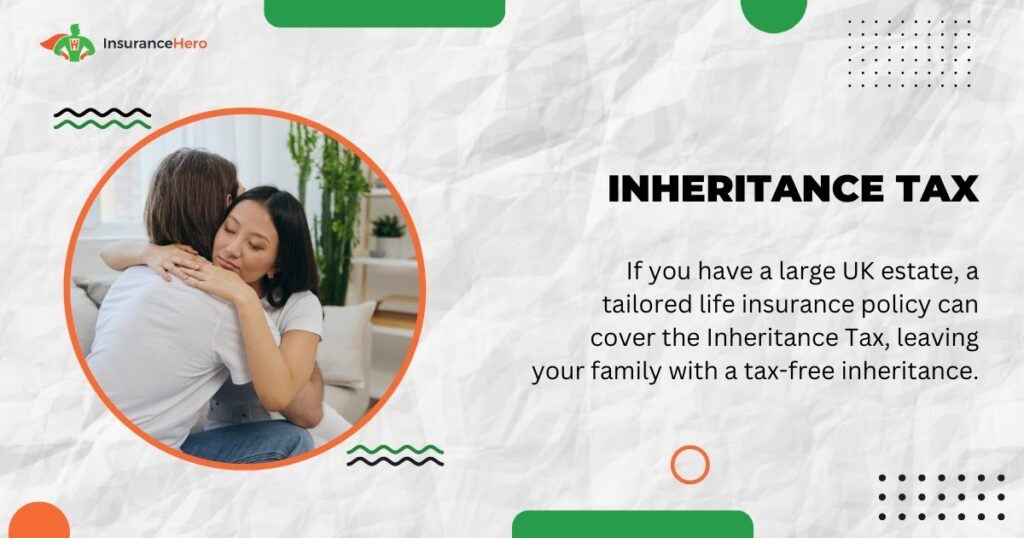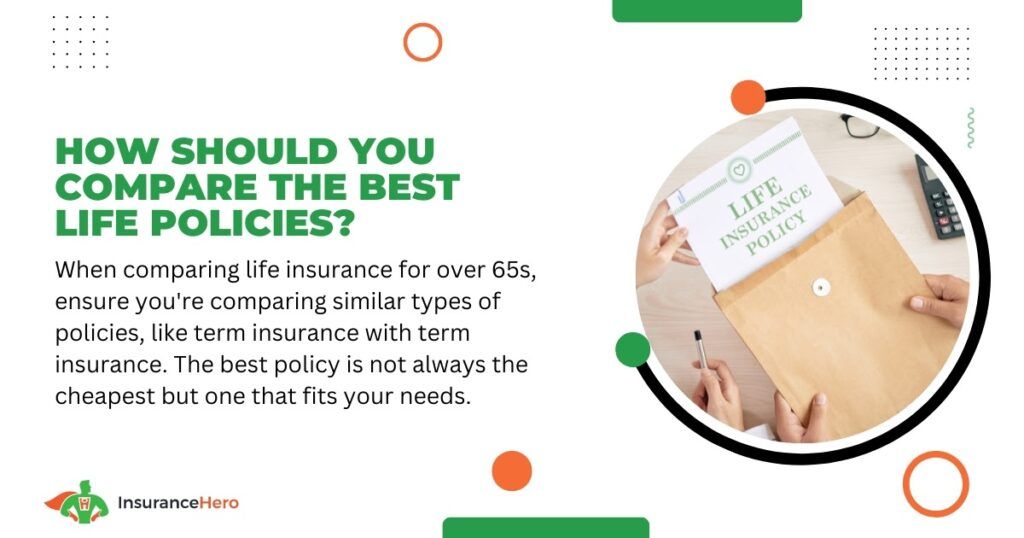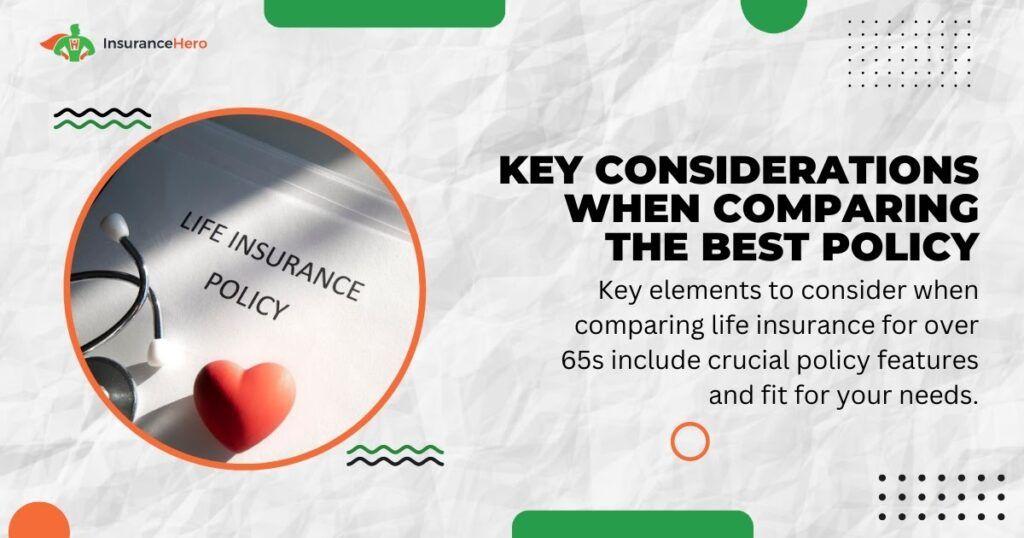Life Insurance For Over 65: 2025 Quotes And Policies

Do you have loved ones who may struggle to pay for your funeral if you pass away?
Do you have an outstanding mortgage to repay? Is there a family member with whom you would like to leave a gift? Life insurance for over 65s may be right for you.
One of the most common questions is: what is the best age to get life insurance?
While the general answer is “as early as you can”, different options are available depending on how old you are. Fortunately, you’re never too old to get life insurance cover.
If you are 65 and over, consider that several life insurance options cater to your needs. Here, we will cover what options may apply to you and what the best policies should provide.
Looking For The Best Life Cover? Easily Compare Over 60’s Life Cover Via Our Simple Quote Process

What is Over 65 Life Insurance?
Life insurance for over 65s is one of several life insurance policies specifically aimed at seniors.
They exist because traditional life insurance policies typically have an upper age limit because of the increasing risk of your passing the older you are.
Rather than leaving you with no options in your golden years, insurance providers have created life insurance policies for seniors, catering to your specific circumstances as you age.

There are several important differences between a traditional life insurance policy and over-65s cover that we’ll discuss later on in this post.
The basics, though, are the same: you purchase a policy, pay premiums, and when you pass, your beneficiary receives a payment according to your death benefits.
Why Do I Need Life Insurance Over 65?
For those over 65, life insurance can serve purposes that differ from younger policyholders, especially regarding inheritance tax and funeral considerations. Below are several reasons for taking out life insurance.

Outstanding debts
If you pass away, do you have any outstanding debts that need paying off? Liabilities may include credit card bills, personal loans, hire purchase agreements, car loans, or bank overdrafts.
A life insurance policy can provide a lump sum to beneficiaries to pay off debts, giving you peace of mind that your financial affairs are in order.
Inheritance tax
If you have a substantial estate that you will pass on to your family in the UK, there will be an inheritance tax bill to pay.

A life insurance policy can be individually tailored to pay off an Inheritance Tax bill, so your dependents are left with an unencumbered estate.
Mortgage repayment
If you are 65, you may have taken on a short-term mortgage, equity release loan, or another secured loan.

These financial obligations can significantly burden your spouse or descendants after you pass away. Still, your life insurance payment can cover those debts and leave the remainder of your inheritance untouched.
Funeral expenses
The average funeral cost in the UK is over £4,000, and many over 65s have not made provisions to pay for their funeral costs, with dependents having to shoulder the cost of putting you to rest.

A simple guaranteed acceptance policy can provide a small lump sum when you die, allowing you the peace of mind that your death will not financially burden your loved ones.
Charitable donation
Leaving a lump sum to a favourite charity or good cause may be something you want to provide for as you get older.
You may wish to support that charity but avoid the drama of taking away from an inheritance to do it, or you may simply not have the assets to leave to charity.

A life insurance policy can have a charity as a beneficiary, so when you pass away, the payment goes directly to support their ongoing operation.
Tax-free gift
A gift is a lump sum left to a loved one when you die.

A gift can be used for any purpose, including buying a car, putting down a house deposit, or paying for further education.
It is often left for children or grandchildren and is a tax-free way of providing a financial reward upon your death.
What Is the Best Life Insurance for Seniors?
The best life insurance cover for those over 65 depends on your circumstances and directly correlates to reasons for taking out life insurance.
If you take out insurance to pay off the remainder of a mortgage, the policy will differ from someone who wants to pay their funeral costs.

It would be best if you took care when looking for cover, as an over-50s life insurance policy may not be the right product for you.
Here we run through the three main life insurance options for over 65s.
Depending on your particular circumstances, options that may apply to your situation include term life insurance, over-50s life insurance plans, and whole life insurance.
Life Insurance Over 50 Cover
Originally made famous on national television by SunLife, one of the leading providers of this kind of cover is the Over 50s Life Insurance Policy.
Over-50s life cover from Insurance Hero serves the 50—to 80-year-old age group. It is a fixed-term insurance policy with premiums continuing up to a maximum age that can vary from 80 to 90, depending on the provider.

Although the plan has a fixed term, most life insurance providers will keep it running with no additional premiums required once you have reached your maximum age. The plan pays a lump sum upon your death.
Some of the benefits of over 50s life insurance coverage include:
Guaranteed acceptance
Life insurance for over 50 policies does not require a medical evaluation, which is why they are also known as guaranteed acceptance insurance. Prior medical conditions do not need to be declared.
The drawback is that the payouts are much smaller than those of other types of life insurance that require medical screening.

In return for guaranteed acceptance, providers rarely offer to pay out amounts exceeding £20,000 to £30,000.
As a result, the insurance can only be used for lower-value purposes and not for covering mortgage repayments or large inheritance tax bills.
Regular uses for over 50s plans often revolve around paying for funerals, repaying small debts, gifts to loved ones, or charitable donations.
Funeral cover
Many providers offer supplementary funeral plan cover as part of an over-50s policy. In return for using a specific funeral director, a small lump sum is paid towards your funeral costs and the lump sum payout amount is paid to designated beneficiaries.
Fixed Term Life Insurance for Over 65
Term life insurance is the most popular type of life insurance for younger age groups. However, many insurance providers set an age limit for term life cover and will not issue policies to people over a certain age.
Fortunately, those age coverage limits are usually 70, 80, or even 90, so if you’re between 50 and 70, it may still be a good option.

Term insurance only covers a set period, meaning the life policy will not pay out once it expires. If you outlive your policy, you either have to extend it – often for a higher premium – or let it lapse and have no cover.
There are generally three kinds of term life cover:
First, you have increasing term life insurance. The death benefit for this kind of cover grows over time to adjust for rising living costs and inflation. Consequently, the premiums generally increase over time as well.
Second, you have flat-term life insurance. This cover is fixed for the entire term; your premiums and your benefits remain the same from year one to the end of the term.
Third, you have decreasing term life insurance. This type of cover is generally matched to a debt such as a mortgage, with the benefit equalling the amount remaining on the debt.
As you pay off the debt, the benefit from the cover and the premiums you pay decrease.
Term insurance requires strict medical vetting, and pre-existing medical conditions will also be considered before you receive a policy quote.
As term insurance has a fixed maturity date, you should find that fixed-term policies are cheaper than whole-of-life options.
Whole of Life Cover
Whole of life insurance coverage does not expire the way term life cover expires. Instead, it remains as long as you pay premiums to maintain it and pays out when you pass, whether you live to be 70, 90, or 110.

Whole-of-life policies are a sort of hybrid between investment accounts and insurance products, so if you have to cancel, you often receive payment of some equity accrued over the years, though not as much as if you had maintained cover until your passing.
A full medical and a declaration of any pre-existing medical conditions are a requirement for a whole of life insurance.
Both term and whole-of-life premiums become increasingly expensive as you get older due to the higher risk of something happening to you compared to a young, healthy person.
Additionally, because of the added investment component and the guaranteed payout when you pass, whole-of-life cover is generally significantly more expensive than term-life cover.
The cost may be very high for those over 65, but rather than get disheartened, it is essential to keep shopping around for competitive life insurance quotes.
How Should You Compare the Best Life Policies?
You must compare life insurance like for like when considering life insurance for the over 65s.
For example, if you are comparing term insurance, it must be judged against similar-style policies and not an entirely different type of product, like an over-50s plan.

The best life insurance for over 65 policies is not necessarily the cheapest. They are the policies that align closely with your circumstances.
Key Considerations When Comparing the Best Policy
When considering life insurance for people over 65, crucial elements should be part of a robust policy.

Here are important areas you should be aware of when comparing the best life policies:
How much cover do you need?
Cover refers to the sum assured or the lump sum paid to designated beneficiaries should you die.
The amount of coverage relates directly to your circumstances. For those looking to pay for funeral costs and are looking at an over 50s plan, with the average cost of a funeral in the UK being £4,000+, your cover requirements are low.
On the other hand, for an over-65-year-old looking to cover a repayment mortgage, the cover requirements will be substantially more and require medical acceptance as part of a fixed-term policy.
How long do you want your cover to last?
Determining how long you want your cover to last comes down to the reason you’re seeking life insurance over 65 in the first place.
For example, if you are an older parent, a plan might be to ensure your children can complete further education, or that a mortgage or equity release loan can be repaid. When these life events finish, then so should your life cover.
Alternatively, if you want as much of a payment as possible to secure an inheritance for your children and help build generational wealth, cover that lasts indefinitely may be the better option.
What is the cost of cover?
The cost of cover is the monthly premium paid to the insurer, who will provide a sum assured should you die.
When comparing the cost of coverage, an over-50s plan with guaranteed acceptance is not the same as term insurance with strict medical vetting.
Seeking the cheapest premium will not always get you what you want. Instead, consider other factors, such as term, payout, and medical riders, and compare plans with those attributes to find the most affordable cover for your needs.
What is the claims process?
Consideration should be made to how long a payout takes after a claim. The information is available in a policy’s definitions.
Researching an insurer’s payout percentage can also be useful if you need more comfort with the claims process.
Are there maximum entry age limits?
The maximum age limit for entry into a plan is another consideration worth keeping an eye on. Not all insurers offer a uniform age of acceptance on a policy, and there may be an age cut-off.
Life Insurance Over 65 Without a Medical Exam
As people age, the need for life insurance may evolve, but it doesn’t diminish.
Obtaining life insurance can sometimes be a challenge for those over the age of 65, especially if they have pre-existing medical conditions or are concerned about undergoing a medical examination.

Recognising this need, many of the UK’s best insurance providers now offer policies that do not require a medical exam for individuals over 65.
These “no medical exam” policies are designed to provide coverage without the need for extensive health checks, making the application process quicker and less invasive.
Benefits:
- Simplified Application Process: Applicants can often complete the process online or over the phone in minutes without needing a medical exam.
- Quick Approval: Since medical test results are not required, policies can be approved and issued more rapidly.
- Inclusivity: These policies are especially beneficial for those who might be denied coverage based on a traditional medical exam, ensuring that more seniors have access to life insurance.
Considerations:
- Higher Premiums: Due to the increased risk taken on by the insurer without a full understanding of the applicant’s health, premiums for no-medical-exam policies can be higher than traditional policies.
- Coverage Limits: The amount of coverage one can obtain without a medical exam might be limited.
- Waiting Periods: Some policies may have a waiting period before full benefits are payable.
While life insurance for seniors over 65 without a medical exam offers a convenient and inclusive option, it is essential to weigh the benefits against the potential costs.
Case Study: John’s Decision to Secure His Family’s Future with Seniors Life Insurance
John, a 68-year-old living in Kent, had always been prudent about his financial decisions. With grown-up children and a loving wife, Mary, also in her sixties, he wanted to ensure they would be well taken care of, even in his absence.
After thorough research and help from the Insurance Hero team, John invested in an over 65 life insurance policy.
Benefits for John and His Loved Ones:
- Peace of Mind: Knowing that his family would be financially secure gave him peace of mind. The seniors life insurance policy ensured that Mary wouldn’t have to worry about sudden financial burdens.
- Financial Security for Mary: In the event of John’s passing, the insurance payout would provide Mary with a substantial amount to help maintain her current lifestyle without any financial strain.
- Support for Grown-Up Children: While John’s children were independent, the insurance would serve as an additional safety net, helping them in times of unexpected financial needs or emergencies.
- Coverage Tailored to Seniors: The life cover over 65 was specifically designed to consider seniors like John’s needs and health conditions. This meant he didn’t have to undergo rigorous health checks, and the premiums were affordable.
- Legacy for Grandchildren: John and Mary cherished their grandchildren. The insurance policy ensured they could leave a legacy for their future education and well-being.
John’s decision to opt for a seniors life insurance policy ensured his loved ones would be well cared for. The over-65 life insurance was a testament to his love and foresight for his family’s well-being.
Life Insurance for Over 65 FAQs

Now, let’s answer some of the most frequently asked questions we receive regarding over-65s life insurance cover.
Can I put my policy into trust?
The ability to put your life insurance into a trust is a complicated structure used in financial planning and estate management. Not all insurance providers offer this ability, so you’ll need to discuss the option with the providers you’re looking into.
Will premiums go up every year?
This depends entirely on the kind of policy you purchase. Policies will typically have different options regarding premium payments. Level, increasing, or decreasing premiums are all options that do exist as part of life insurance.
Can I get a joint policy?
Some, but not all, life insurance policies allow joint names. Mostly, over-50s life insurance policies do not typically allow for joint policies, but some may; you must ask your insurance provider. That said, it’s also worth looking into the pros and cons of a joint policy in the first place. It’s not always the best option. For more information, please read our guide on single versus joint life insurance cover.
How much does life insurance cost?
Life insurance for over 65s can cost as little as £7 a month for a guaranteed acceptance policy, paying out a small sum to cover funeral costs when you die. The longer the term (or for whole-of-life cover), the larger the payout, and the broader the acceptance, the more expensive it will be.
Do I need to undertake a medical?
Guaranteed acceptance life insurance, also known as an over-50s plan, does not consider medical history when considering policy applications. Whole life and fixed-term life insurance covering significant amounts require medical approval for acceptance onto a plan.
Is it worth getting life insurance at 65?
Life insurance at 65 can be worth providing financial security for loved ones and covering end-of-life expenses. However, premiums may be higher, so weighing the benefits against the costs is essential.
Is 67 too old for life insurance?
No, 67 is not too old for life insurance. Many providers offer policies tailored for seniors, though premiums may be more costly due to your age.
The need to take out life insurance relates directly to your circumstances.
A guaranteed acceptance plan can provide peace of mind that funeral costs and small debts will be covered when you die.
Other options, including term insurance that requires medical acceptance for more substantial coverage, also have their uses for over 65s.
Give your family the financial security they deserve by getting life insurance. It’s one of the best things you can do for them, and it doesn’t have to be as expensive as you think.
Get a no-obligation free quote today and see how affordable peace of mind can be.
Steve Case is a seasoned professional in the UK financial services and insurance industry, with over twenty years of experience. At Insurance Hero, Steve is known for his ability to simplify complex insurance topics, making them accessible to a broad audience. His focus on clear, practical advice and customer service excellence has established him as a respected leader in the field.


